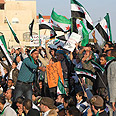
Bomb in Palestinian camp in Syria kills 4
Explosion late Thursday in Yarmouk camp targets Popular Front for the Liberation of Palestine-General Command; member of faction that has backed President Assad seriously wounded
Syria's Foreign Ministry, meanwhile, lashed out at neighboring Turkey, which has sheltered anti-Assad fighters.
Related stories:
- IDF kinder than Assad's army' Arab paper: Syria, Iran instigated Gaza conflict
- IDF jeep hit by stray bullets from Syria; no injuries
The ministry denounced Turkey's request for NATO Patriot surface-to-air missiles along its border with Syria as "a new provocative step." Turkey made the request earlier this week to bolster its defenses and prevent a spillover of the Syrian civil war onto its territory.
The Damascus explosion late Thursday in the Yarmouk camp targeted the Popular Front for the Liberation of Palestine-General Command, the Palestinian group said.
Four people died and a PFLP-GC activist was seriously wounded when the bomb planted under his car went off, the group said, blaming the rebel Free Syrian Army for the attack.
Yarmouk has been pulled into Syria's fighting before, most recently earlier this month when clashes in and around the camp killed and wounded dozens.
The refugee camp is near two southern neighborhoods of the capital – Tadamon and Hajar Aswad – where rebels and government troops have clashed for weeks.
Regime forces shelled the two neighborhoods on Friday and also raided the central Damascus neighborhood of Bab Sreijeh, arresting several people there, said the Britain-based Syrian Observatory for Human Rights.
State-run TV reported that a suicide attacker blew up his car in the northwestern Idlib province Friday, killing at least three people and wounding four. There were no other details.
Iranian parliament speaker meets Assad
Also Friday, visiting Iranian parliament speaker Ali Larijani held talks with Assad and other officials in Damascus on his way to neighboring Lebanon.
Iran is Assad's strongest ally in the region, and anti-government activists accuse Tehran of sending both weapons and fighters to Syria.
Before meeting with Assad, Larijani met with leaders of Syria-based Palestinian factions, including the PFLP-GC, and discussed the latest Israeli-Hamas spasm of violence in Gaza that ended with an Egyptian-brokered truce on Wednesday.
Larijani "congratulated the Palestinian people for the victory in Gaza" and pledged more Iranian assistance to Palestinians there, said Khaled Abdul-Majid, a Damascus-based Palestinian official who attended the meeting.
In other violence around Syria, Islamic extremists, including members of the al-Qaeda inspired Jabhat al-Nusra group, battled Friday with pro-government Kurdish gunmen in the northern town of Ras al-Ayan, near the border with Turkey. The Islamic militants entered the town earlier this month and have since clashed almost daily with the Kurdish gunmen.
The Islamic militants and the Kurdish factions have added to the complexity of Syria's conflict.
When government forces withdrew from Kurdish areas in northeastern Syria in July, they were quickly replaced by Kurdish fighters from the Kurdish Democratic Union Party, or PYD, who would then battle rebels when they attacked predominantly Kurdish areas. The Kurdish group is affiliated with the PKK, rebels fighting for autonomy in the Kurdish-dominated southeast region of Turkey.
The Islamic militants, who are fighting on the side of the rebels, have played a bigger role in the Syrian conflict in recent months and many openly say they want to set up an Islamic state. The opposition is split, with some groups strongly opposed to extremism.
Syria's conflict erupted in March 2011 with an uprising against Assad's regime, inspired by other Arab Spring revolts, but quickly morphed into a civil war that has since killed more than 40,000 people, according to activists.
When the unrest began, the country's half-million Palestinians struggled to stay on the sidelines. But in recent months, many have started supporting the uprising although they insisted the opposition to the regime should be peaceful. Others, like the FPLP-GC, stood by Assad. Earlier this month, FPLP-GC clashed with anti-government Palestinian gunmen in Yarmouk.
In other reports, the Observatory said the body of Syrian novelist Mohammed Rashid Roweily was found late Thursday in the eastern city of Deir el-Zour, nearly two months after he was kidnapped. State-TV said Roweily was "liquidated by terrorists" – a term the government uses for the rebels.
Ruwiely, 65, was once the representative of Arab Writers' Union in Deir el-Zour and had written several novels. The Observatory said his decomposed body was found along with four other bodies, including that of a retired army officer. All were kidnapped around the same time.
Syrian authorities deny there is an uprising in the country and say the rebels are backed by foreign powers that seek to destroy the country.
Journalist Bassil Toufic Youssef, who worked for state TV, was shot dead outside his house in the capital on Thursday, said the state SANA news agency.
In other developments, Qatar, which has backed Syria's rebels in the conflict, invited the newly formed opposition coalition to appoint its ambassador to the Gulf state, the Qatari news agency reported.
The broad coalition – called the National Coalition of the Syrian Revolutionary and Opposition Forces – was formed November 11 in Qatar under pressure from the United States for a stronger, more united opposition body to serve as a counterweight to the more extremist forces fighting Assad's regime.
The six-national oil-rich Gulf Cooperation Council and the European Union's 27 foreign ministers recognized the Syrian coalition. Last week, France became the first Western nation to officially recognize the council. President Barack Obama said the US isn't ready to recognize the group as a "government in exile" or to arm it.
- Follow Ynetnews on Facebook and Twitter
- Receive Ynetnews updates directly to your desktop










